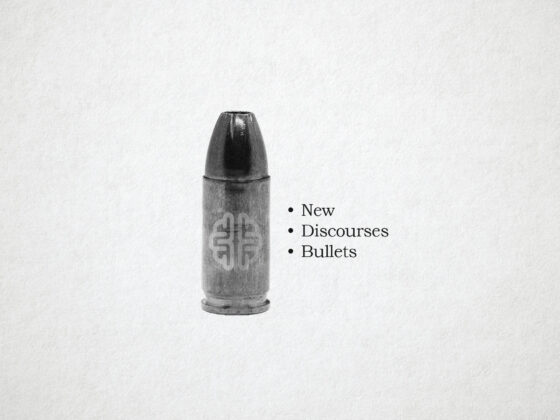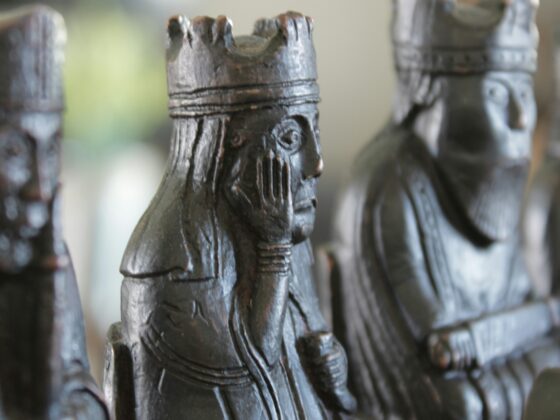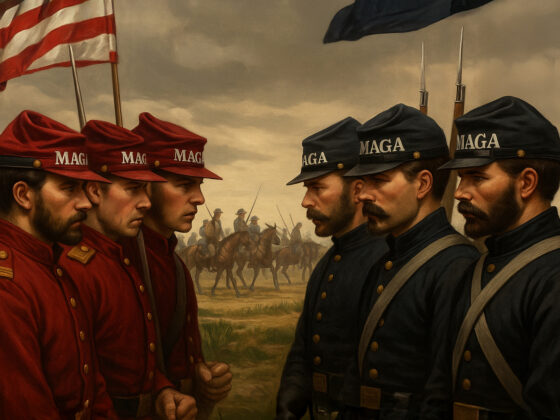The New Discourses Podcast with James Lindsay, Episode 13
Human beings think in stories. We understand ourselves and the world, societies, social groups, and contexts we live in that way. One type of story is a national story, and in this episode of the New Discourses podcast, James Lindsay makes the case that Americans have, by and large, forgotten the totality of their own story. This has happened by placing too much focus and too much emphasis on one valuable and important part of the American story, which is equality. All men are, in fact, created equal, at least so far as liberal ethics should understand men, but this part of the American story exists in some tension with the other parts, especially the liberty part of the story, which is threatened by an overemphasis on equality in the same way that equality is threatened by an overemphasis on liberty. The truth is, even on a perfectly equal playing field, liberty will produce unequal outcomes because people will behave in unequal ways, and this form of inequality of outcome is just, even if inequality of opportunity isn’t.
In this podcast, Lindsay argues that Americans have mistaken the equality part of their story for the whole story, and in that the equality part of their story has been largely but not perfectly fulfilled, Americans now find themselves retelling the story in ever more tendentious ways, including Critical Social Justice. That is, Americans, in seeking to understand themselves against their own story, which they have misunderstood, are telling a kind of genre fiction on the equality story, trying to resurrect its themes in new ways to give themselves meaning and personal and social context. The Critical Social Justice, or Woke, story is comprehensible as a certain type of genre fiction on the equality portion of the American story, one that inverts the very values it claims to espouse in the pursuit not of further equality but of equity, which is a type of enforced equality of outcomes, regardless of behavior, talent, and merit.
In the end Lindsay urges Americans to remember the totality of their story: liberty and equality in balance with one another, government with the consent of the governed, and a place, at least one place in the world, where these values can be kept alive. The American story has not been fulfilled, although it is not necessarily clear what its next chapters are. This podcast hopes to start finding the next parts of the American story. In that, Lindsay urges that Americans today are called to be keepers of the flame of liberty in a society that values and has, in largest part, achieved equality. They are also encouraged to offer their balanced model of federalism and anti-federalism, individual and national sovereign liberty, in this case, to the world as globalism increases with technology. Should the world refuse, Americans should not turn their backs on their story but should, instead, keep the flame of Americanism burning bright for any who should want it.
Subscribe to this podcast on SoundCloud, Apple Podcasts, Google Podcasts, Spotify, Stitcher, YouTube, or by RSS.
Previous episodes of this podcast are available here.











15 comments
I know of one great alternate reality that persuasively illustrates how the US could have won the Vietnam War but lost the Cold War!
https://tvtropes.org/pmwiki/pmwiki.php/Literature/FearLoathingAndGumboOnTheCampaignTrailSeventyTwo
Isaiah Berlin’s “Two Concepts of Liberty” is also IMO very helpful.
https://en.wikipedia.org/wiki/Two_Concepts_of_Liberty#:~:text=%22Two%20Concepts%20of%20Liberty%22%20was,Oxford%20at%20the%20Clarendon%20Press.
You may appreciate this old book by Aaron Wildavsky, which foresaw the American forces that led to the rise of the Successor Ideology.
https://contemporarythinkers.org/aaron-wildavsky/book/the-rise-of-radical-egalitarianism/
The point of James Lindsay’s article is that we no longer understand, and are no longer correctly telling, the American story, and are thereby selling America short in our public discourse. We once proudly told the heroic story of an America that overthrew a tyrannical government and developed a system of democratic government – a constitutional democracy – that has served for more than two centuries as a model of liberal government for the world to follow. That government was founded on the cornerstones, mentioned in the Preamble, of equality, inalienable rights, government by consent of the people; and the right to replace the government if it “goes off the rails.” But now our storytelling focuses solely on equality, and neglects the other three cornerstones provided by the Founders. In short, the author tells us, “we are telling the wrong story … equality is not the story.”
The American story seems to have gone astray when the Civil Rights Act “finally ended officially sanctioned institutional racism.” Following the Civil Rights Act, we should have moved on to a new chapter of American history, but were unable to do so. We have been prevented from moving on by the development (by Critical Race Theory) of the “genre of equality fiction.” CRT and the equality fiction genre has performed a “values inversion” and stolen the narrative from the true American story. This has served to divide the country, whereas a properly written next chapter of the American story would, quoting from the Preamble of the Constitution, “secure the domestic tranquility.” The author does not define what is meant by the values inversion, nor does he support the existence of a genre of equality fiction, though these assertions underpin his arguments.
The author suggests that one way out of this storytelling deficit is to return focus to the neglected cornerstones mentioned in the Preamble, perhaps emphasizing inalienable rights as treated by the 10th Amendment. We should reject the values inversion of CRT and the fictional equality narrative and focus our continuing American story on the important compromise between federalism and states’ rights’. This uniquely American model of political organization can help the European Union better organize politically and avoid future problems. Other states might then follow the EU in this path, so that the American invention of a constitutional republic can once again be the leading light of liberal government in the world.
I feel like I’m butting into a conversation of folks much smarter than myself. I’ve been relatively new to the fields of philosophy and history, in relation to how it manifests in daily life. Still, I think that using story telling to spread information is what has been a contributing factor to the rise in dangerous ideologies of today. I think a slow read of the actual text of the constitution (instead of the first result of a google search) would surprise most on the left, and may even encourage them to re-identify their goals to align with it. The current trend is to follow the popular opinion of contrarianism before knowing what exactly they oppose. I used the constitution as an example, but other ideas might include Abraham Lincoln, religiousness, or freedom of speech. The problem is that the left only has to defeat the storytelling of the traditions of the liberal society in order to be where they are now, and we haven’t taught enough of the population to identify that.
Thanks for your comment. I think an enormous piece of the current problem is that people (most, but not all) have stopped reading. Here’s what Ray Bradberry had to say about that: “You don’t have to burn books to destroy a culture. Just get people to stop reading them.” This is out of the book, Fahrenheit 451.
My (others’ too) opinion: America seems to have become a society of people where are preoccupied with fame, personality, and being liked. Change that dynamic and one has a better chance of reversing wokeness.
Parents/Caretakers need to emphasize the importance of reading and learning hard facts. Reading fiction is a good method for students to learn patience, comprehension, vocab, and empathy. Remember, what we do read affects how we speak, write, and ultimately how we think. Unchallenging and poorly written books tend to produce poor writing and speaking skills in the reader.
By the way, I think you’ll find your journey to learning more about philosophy and history rewarding. Knowledge in these areas, I think, allows people to have a better understanding of current events and possible future outcomes. I think no matter one’s age, something new should be learned every day. It could be a simple as looking up the definition of a word you don’t know-that will help in future writing and reading.
Indeed, Cal, “Just get people to stop reading them.”
One way for TPTB to do that is, to get people reading short diatribes on social media.
And, it may be easier for Parents/Caretakers to emphasize the importance of reading and learning hard facts, if facts are presented thru “maps” of the (different views on) issues of historical contention.
Jacob, good luck in your efforts to bone up on important things!
Indeed, getting kids to focus on facts, thru “maps” of the (different views on) issues of historical contention, may be easier than usual, in these times of such great historical contention.
I’m curious which dangerous ideologies of today you are referring to – i.e., those that have arisen from storytelling. I’m actually a member of the left (as most moderates seem to be classified today), and yet I don’t feel that I’m in disagreement with any of the founding documents, and I am not consciously trying to defeat the storytelling of the liberal traditions that I revere. Help me understand what you mean.
Good stuff, Cal & gmmayo70.
Yeah, storytelling as a medium can seem dumbed down, but in these historical circumstances (of a country so split), it’s apt, if not crucial.
It should be easy, and is important, to get kids to want to understand, that this current US impasse has deep origins, which are well worth trying to understand, not only as a academic exersize, but as a survival tool, in an environment where so many of the kids’ family & peers are likely to be so on edge.
Each of these two factions has big beefs vs. the other, going back, sometimes years, sometimes decades, sometimes generations.
(I first got hooked on political stuff, when JFK was disposed of.)
Hello gmmayo70-
On your first sentence-I smiled and chuckled a little. I didn’t recall using the term “usable action” in my earlier post.
I think we agree that a plan of action against Critical Theory ideology incursions is well, critical to the survival of liberty and individuality in America. Successful resolution of an issue should revolve around a treatment plan. It should look something like this:
Intake Interview/Client’s Demographics and History
Problem Identification/Assessment and Diagnosis
Treatment Goals
Objective Goal Measurement Techniques
Techniques/”What will we do to fix this problem”
Implementation
Evaluation
I think we’re at the Techniques stage. Of course, not everyone is at that point-they aren’t aware of Gramsci, Freud’s belief that people are forever doomed to suffer problems they “didn’t cause”, or The Frankfurt school, etc. They need to understand the problem first. Education must continue.
As you rightly noticed, I feel irritated when people are happy to complain, but choose not to act. There’s no progress/growth there.
On another note, you are spot on about the unhealthy relationship between corporations and the Left. This same unhealthy dyad exists with government-Crony capitalism. That, of course, is not the same as the Free Market.
We need to act.
I appreciate your input gmmayo70. I didn’t realize that business bought into that notion of “make thing/ideas relatable”. Thanks for bringing that to my attention. I do understand the human necessity for having a compelling reason to remember and care about an idea/event, etc. Also, I know and agree that each person has a unique learning style-not everyone learns in nor uses the same senses for learning.
Nevertheless, storytelling as a medium, seems dumbed down to me. I also agree that current students have shorter attention spans, less capacity to delay gratification, are more easily frustrated, and expect learning to be easier than did earlier students.
I suspect the academic disciplines that don’t use storytelling include computer science, chemistry, physics, and mathematics. Enough said there.
Finally, I like your term, “usable action”. It sounds better (more relatable maybe) than my psychology “operationalize” term.
I can’t take credit for “usable action”. I lifted it from your first comment.
There’s something to that. The radical Left has long been extraordinarily active. Their treatises and applied theories on action go back to Marx, through Gramsci, Cloward-Piven, and Alinsky (who understood the psychology). Of course that’s by no means a comprehensive list.
Content more or less with the status quo, everyone who prized the idea of a pluralistic liberal democracy simply thought of radical illiberalism “that can’t happen here”, while the radical Left took action for the last 130 years to make it happen. Any response to the alarming rise of CT-fueled radicalism is going to require action.
The radical Left has massive infrastructure to facilitate action, now fueled by megabucks from megacorps. It’s long past time for the rest of us to get started.
This podcast is too long, focuses far too much on race, and repeats themes. I do not hear any useable action suggested re: repelling Critical Theory in American government and social realms.
The analogy of American history being a story doesn’t appeal to me. Stories and facts are not the same thing.
If Americans are to preserve liberty and individuality, elementary/secondary schools should actually teach history and civics. People don’t understand “American’s story”, because they were never properly taught it.
Fun fact: Only about 35% of Americans can identify the Bill of Rights. School teachers need to do a better job. Are schools really that bad now?
Answering your last question first: yes.
As to story, this is the current trend across any number of industries (it’s huge in marketing) and an increasing part of teaching various academic disciplines, particularly history. Something in the education system has instilled a need for the younger generations to be able to relate to information or people to be able to internalize it or learn about it. I’m not convinced these new techniques are any more successful or efficacious, but younger generations tune out far faster without that relation mechanic.
I don’t think that story is an inherently bad way to teach history, as I’ve had conversations with people who loathed history and used a story method or Why It Matters explanation to get them to say, “Gosh, I never really knew that or thought about it that way, that’s really interesting.” But that’s not as easy, and easy is holy today.
It’s unfortunate to see that their podcasts tend to follow the articles in not exploring “usable action”.